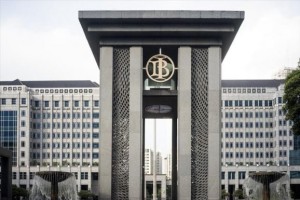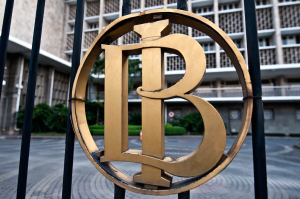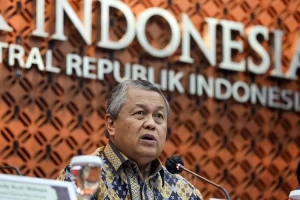BI maintains benchmark interest rate amid threat of global economic slowdown
The Board of Governors Meeting of the Indonesian Central Bank (BI) on April 22-23, 2025 decided to maintain the benchmark interest rate (BI Rate) at 5.75 percent over consideration of increased uncertainty amidst U.S.-China trade tariffs war and threat of slowing global economic growth.
BI Governor Perry Warjiyo said the decision is in line with efforts to keep inflation within the target of 2.5±1percent in 2025–2026 as well as the stability of the Rupiah exchange rate amid external pressures.
"Moving forward, Bank Indonesia will continue to monitor the scope for further BI Rate reductions by considering the stability of the Rupiah exchange rate, the outlook for inflation, and the need to encourage economic growth," Perry told a media conference on Wednesday, April 23, 2025.
BI acknowledges the potential for a global economic slowdown this year, with global growth projections declining from 3.2 percent to around 2.9 percent. This was triggered by the U.S. reciprocal tariff policy and retaliatory responses from China and other trading partner countries, which exacerbated global economic fragmentation and depressed international trade volumes.
Indonesia is also affected. Perry estimates that national economic growth this year will be slightly below the midpoint of the 4.7–5.5 percent range, due to a decline in direct exports to the U.S. and a decline in demand from China as a major trading partner.
“Various policies need to be strengthened to mitigate this impact, including encouraging domestic demand and taking advantage of export opportunities," Perry said.
Pressure on the rupiah exchange rate is also a concern. BI noted that in early April 2025, the rupiah exchange rate was under pressure due to negative sentiment from the U.S. tariff policy.
To maintain stability, BI intervened in the foreign exchange market simultaneously in Asia, Europe, and New York. As a result, the rupiah exchange rate strengthened slightly from Rp16,865 to Rp16,855 per U.S. dollar as of April 22, 2025.
On the other hand, capital outflow pressure from the Indonesian financial market is still high. BI recorded portfolio investment outflows reaching US$2.8 billion until April 21, 2025, due to increasing global uncertainty. Indonesia's Balance of Payments (NPI) is also predicted to have a deficit in the range of 0.5-1.3 percent of GDP this year.
However, BI is optimistic that inflation will remain under control. Core inflation is expected to be stable thanks to maintained inflation expectations, adequate economic capacity, and the positive impact of digitalization. Volatile food (VF) inflation is also believed to be controlled through BI's synergy with the central and regional governments.
Goldman Sachs Forecast
U.S. Investment Bank, Goldman Sachs, has earlier expected Asian central banks to become increasingly dovish or tend to lower interest rates in response to slowing growth and external pressures.
The Indonesian Central Bank is expected to cut interest rates by 100 basis points (bps) from the current level of 5.75 percent to 4.75 percent by the end of this year, making it the largest cut among major Asian economies.
BI's interest rate cut is predicted to take place in two stages, each 50 bps in the second and third quarters of 2025. This step is considered important considering that inflation in Indonesia is at its lowest level in two decades, namely 0.76 percent annually (YoY) in January and experiencing deflation of -0.1 percent in February.
Although core inflation was recorded as increasing to 2.5 percent, this was more due to the increase in gold prices and people's tendency to save than increase consumption. Labor market conditions have also weakened due to the labor-intensive sector being depressed, triggering layoffs in various industries.
However, BI has so far remained cautious in lowering interest rates due to concerns about the depreciation of the rupiah. The rupiah is under pressure due to portfolio outflows along with global uncertainty and the strengthening of the U.S. dollar.
Goldman assessed that BI's interest rate cut is still needed to stimulate domestic growth. "Currency depreciation is inevitable, but supporting growth prospects is a priority at this time," the report wrote.
So far, BI has relied on instruments such as Bank Indonesia Rupiah Securities (SRBI) to maintain rupiah stability. This instrument is considered successful in increasing Indonesia's foreign exchange reserves from US$136 billion in April 2024 to US$157 billion in April 2025.
However, Goldman emphasized that BI must currently focus on its domestic mandate: reversing the deflationary trend and stimulating the labor market with a more accommodative monetary policy.
Already have an account? Sign In
-
Start reading
Freemium
-
Monthly Subscription
30% OFF$26.03
$37.19/MonthCancel anytime
This offer is open to all new subscribers!
Subscribe now -
Yearly Subscription
33% OFF$228.13
$340.5/YearCancel anytime
This offer is open to all new subscribers!
Subscribe now






